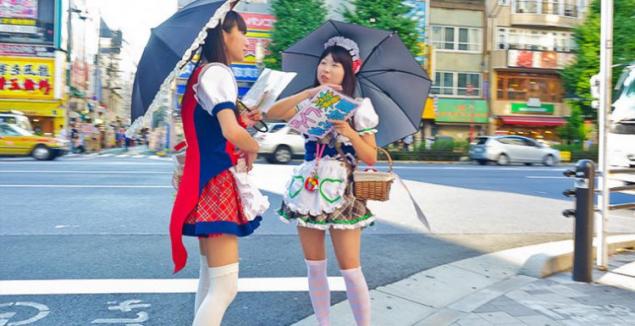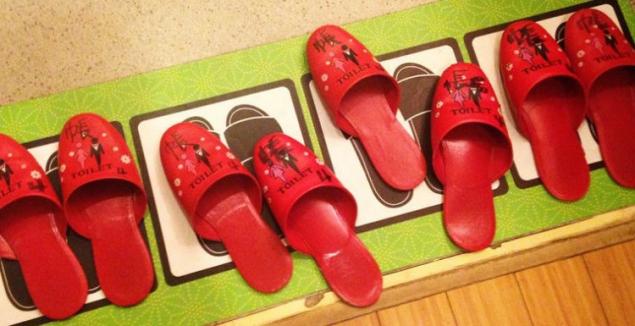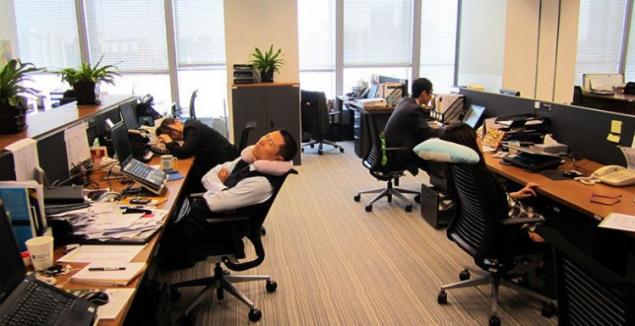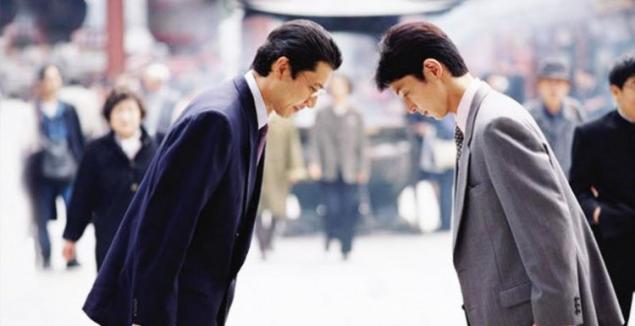548
The Japanese well, Russian does not understand
They sleep in the meetings referred to the interlocutor in the third person and wear special shoes when they go to the toilet. What else Japanese customs are different from ours?
1. They use shill

In the shopping streets of Japan is better not to go out without earplugs. The owners of local shops and cafés are still very actively use cheap advertising effect - touts. Cute boys and girls standing at the entrance to the restaurant, loud and almost continuously shouting: «Irrashyaimashe! Gorankudasaimaseee! », Which can be translated as" Welcome! Look to us! ". Unaccustomed to bear it pretty hard, and foreigners, on the contrary, are often deterred.
2. They do not understand what sin

In Japan, widespread culture of shame, but in the religions (and Shinto, the traditional Japanese religion, and Buddhism) as such, the concept of sin does not exist. Of course, evil deeds are condemned, but only out of fear of losing face, to be dishonored. In particular, foreigners from Christian countries is extremely surprising attitude of the Japanese to commit suicide as a way of salvation, and not as to the fall, it is accepted in Orthodoxy or Catholicism. By the way, in Japan, the highest suicide rates among developed countries.
3. They use
special slippers for the toilet
The hotels and houses some Japanese use plastic or rubber slippers for the toilet and bathroom. Usually they are at the entrance to the bathroom. When you get out, you need to remove and flip-flops left in the same place. In this strange tradition two objectives: first, the Japanese believe that it is more hygienic, and secondly, it is immediately clear that the toilet is occupied. This rule is often confuses foreigners who, of course, always forget to change the shoes.
By the way, visiting the outdoor toilets, too, are often surprising. They are unusual in appearance, and the air inside the first technology. For example, you can play music, to others certainly could not hear what you're doing there. Also, there is a special button to call the security service in case the client will be bad.
4. They sleep on the job

Fall asleep during a meeting with colleagues or directly in the workplace will not be considered embarrassing. Some Japanese practice inemuri, which literally translates as "to be present during sleep." The descendants of the samurai understand that to be effective a person needs a dream, and, therefore, are not ashamed to be given half an hour of working time slumber. At the same time taking into account a few important rules: you need to sleep directly at the table, his head in his hands or countertop; if you fall asleep during the meeting, but addressed to you, you need to wake up and answer; if you are a brand new company and you are expected to actively engage in the work process, the inemuri will be perceived as a bad taste.
5. They refer to each other in the third person

Do not be surprised if the Japanese will ask you: "How is the family of Basil-san," It is not accepted to say the personal pronouns, although in the local language of only one word "I" 15 variants. Residents of Japan are used to address each other in the third person by the name (for official communications) with the addition of the suffix of politeness (san, -The) or by name (among friends) also with suffixes (kun, -chan) <. br>
6. They believe tip insult

In Japan, tipping perceived as an insult, a sign that the waiter can not cope with their work, and therefore, he needs cash incentive.
7. They are painting the trucks

In Japan, the roads can be seen extravagant kind of trucks, looking like Philip on the stage of the Kremlin Palace. They are always bright, often chrome, with neon lights and colorful paintings throughout the body. Such trucks are called "dekotora", they appeared after the release in 1970 of the Japanese cult TV series "Truckers". Drivers of trucks organize meetings and exhibitions of their multi-ton of friends
1. They use shill

In the shopping streets of Japan is better not to go out without earplugs. The owners of local shops and cafés are still very actively use cheap advertising effect - touts. Cute boys and girls standing at the entrance to the restaurant, loud and almost continuously shouting: «Irrashyaimashe! Gorankudasaimaseee! », Which can be translated as" Welcome! Look to us! ". Unaccustomed to bear it pretty hard, and foreigners, on the contrary, are often deterred.
2. They do not understand what sin

In Japan, widespread culture of shame, but in the religions (and Shinto, the traditional Japanese religion, and Buddhism) as such, the concept of sin does not exist. Of course, evil deeds are condemned, but only out of fear of losing face, to be dishonored. In particular, foreigners from Christian countries is extremely surprising attitude of the Japanese to commit suicide as a way of salvation, and not as to the fall, it is accepted in Orthodoxy or Catholicism. By the way, in Japan, the highest suicide rates among developed countries.
3. They use
special slippers for the toilet

The hotels and houses some Japanese use plastic or rubber slippers for the toilet and bathroom. Usually they are at the entrance to the bathroom. When you get out, you need to remove and flip-flops left in the same place. In this strange tradition two objectives: first, the Japanese believe that it is more hygienic, and secondly, it is immediately clear that the toilet is occupied. This rule is often confuses foreigners who, of course, always forget to change the shoes.
By the way, visiting the outdoor toilets, too, are often surprising. They are unusual in appearance, and the air inside the first technology. For example, you can play music, to others certainly could not hear what you're doing there. Also, there is a special button to call the security service in case the client will be bad.
4. They sleep on the job

Fall asleep during a meeting with colleagues or directly in the workplace will not be considered embarrassing. Some Japanese practice inemuri, which literally translates as "to be present during sleep." The descendants of the samurai understand that to be effective a person needs a dream, and, therefore, are not ashamed to be given half an hour of working time slumber. At the same time taking into account a few important rules: you need to sleep directly at the table, his head in his hands or countertop; if you fall asleep during the meeting, but addressed to you, you need to wake up and answer; if you are a brand new company and you are expected to actively engage in the work process, the inemuri will be perceived as a bad taste.
5. They refer to each other in the third person

Do not be surprised if the Japanese will ask you: "How is the family of Basil-san," It is not accepted to say the personal pronouns, although in the local language of only one word "I" 15 variants. Residents of Japan are used to address each other in the third person by the name (for official communications) with the addition of the suffix of politeness (san, -The) or by name (among friends) also with suffixes (kun, -chan) <. br>
6. They believe tip insult

In Japan, tipping perceived as an insult, a sign that the waiter can not cope with their work, and therefore, he needs cash incentive.
7. They are painting the trucks

In Japan, the roads can be seen extravagant kind of trucks, looking like Philip on the stage of the Kremlin Palace. They are always bright, often chrome, with neon lights and colorful paintings throughout the body. Such trucks are called "dekotora", they appeared after the release in 1970 of the Japanese cult TV series "Truckers". Drivers of trucks organize meetings and exhibitions of their multi-ton of friends























